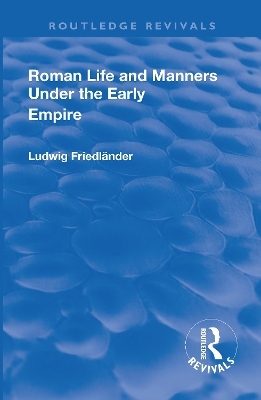
Revival: Roman Life and Manners Under the Early Empire (1913)
Routledge (Verlag)
978-1-138-56547-0 (ISBN)
Originally, for the most part, religious celebrations, they became, even in the later Republic, the best means of purchasing popular favour, and, under the Empire, of keeping the populace contented. Augustus, the tale runs, once reproached Pylades the Pantomime for his jealousy of a rival, and Pylades replied: 'It is to your advantage, Caesar, that the people concerns itself about us'. But these spectacles effected more even than the diversion of popular interest; their magnificence was a gauge of the popularity of the sovereign. The emperors, like Louis XIV, knew how admiration aids absolute autocracy; like Napoleon, that the imagination of the people must be excited: splendid festivals were one of their most indispensable and most constant devices. Even Caligula, according to Josephus, was honoured and beloved by the folly of the populace; the women and the youth did not desire his death; distributions of meat, the games and the gladiatorial combats had won their hearts, for such were the delights of the mob: the lavishing of these gifts was nominally due to consideration for the populace, though the gladiatorial combats were only intended to sate the monarch's lust of blood.
Ludwig Henrich Friedlaender (July 16, 1824 Königsberg – December 16, 1909 Straßburg, German Empire) was a German philologist. He was one of the preeminent scholars of Ancient Rome of his time and is known for his research on Roman daily life and customs. He was a Professor at Albertina and served as its Rector 1865/66 and 1874/5. He was also a member of the House of Lords. He studied at the universities of his hometown Königsberg, Leipzig, and Berlin from 1841 to 1845. In 1847 he became privat-docent of classical philology at Königsberg, in 1856 assistant professor, and in 1858 professor. He retired in 1892 to Strasbourg, where he was honorary professor at its university. He was a son of the merchant Hirsch Friedländer (1791–1871) and Emma Levia Perlbach (1801–1863), and was raised Jewish. He later converted to Protestantism. In 1856, he married Laura Gutzeit, daughter of an East Prussian estate owner. Their son Paul Friedländer was a noted chemist. Their daughter Charlotte Friedländer was married to the art historian Georg Dehio. Alfred Bradley Gough (1872–1939) M.A., Ph.D. was a Casberd Scholar of St John’s College, Oxford. He worked as an English Lector in the University of Kiel, 1896-1905. He wrote the books - On the Middle English Metrical Romances of Emare and Constance Saga.
I The Lotus Tree. (By Prof. Ferdinand Cohn, Breslau)
II Exhibition of natural Curiosities at Rome
III Provincials in Rome
IV Embassies to Roman Emperors from foreign Countries
V The Population of Rome
VI On the Use of Vehicles in Rome
VII Roma aurea, aelerna, sacra
VIII The Officials a rationibus, a libellis, ab epistulis
IX The Order of the Offices held by Imperial Freedmen
X Roman Names assumed by Peregrini and Freedmen
XI The Friends and Companions of the Emperor
XII The Use of Viv Clarissimus as a Senatorial Title
XIII Mandragora
XIV The Sportula of the Clientes
XV The Use of Domine as a Form of Address in ordinary Life
XVI Endearing and complimentary Names for Women and Girls
XVII The Story of Amor and Psyche and other Traces of the Folk-tale in Antiquity
XVIII The usual Age of Girls at Betrothal and Marriage
XIX The Use of Homeric personal Names for Appellatives
XX Roman Finds in the North. (By Dr. Otto Tischler, of Konigsberg)
XXI Tourists' Inscriptions on the Pyramids
XXII The Use of the Word Romantic as applied to natural Scenery
XXIII On the Meaning of the Names Viola (tov), Anemone, Narcissus, Hyacinthus. (By Prof. Ferdinand Cohn, Breslan)
XXTV Three Inscriptions on Charioteers
XXV Diversium
XXVI Representations of Gladiators (and Venatores) in Works of Art
XXVII The gladiatorial Tesserae
XXVIII Summa and Secunda Rudis ; Primus and Secundus Palus
XXIX Costume and Arms of the Gladiators
XXX On the Animals used for the Roman Venationes
XXXI How Animals were caught for the Amphitheatre
XXXII Modern Animal Fights
XXXIII Executions and other Punishments carried out in the Amphitheatre
XXXIV On the Velarium of the Amphitheatre
XXXV Abolition of the Gladiatorial Shows. Gladiatorial Shows in the Middle Ages and more recent Times
XXXVI List of Roman and provincial Amphitheatres
XXXVII The Performance of Comedies under the later Empire
XXXVIII The Performance of Tragedies under the later Empire
XXXIX On the frequent Use of famous Artists' Names
XL The Pyrrhic of Asia Minor .
XLI The Contests in the Actian Agon at Nicopolis
XLII The Contests in the Capitoline Agon
XLIII Continuance of the Capitoline Agon
XLIV The Extension of Gymnastic Contests in the Western Provinces
XLV The Taxes of three Roman Provinces
XLVI Rodbertus on the Comparison of ancient with modem Wealth
XL VII The Dissolution of Pearls in Vinegar
XLVIII A Catalogue of Table Delicacies from a Greek Comedy
XLIX Specification of Silver Plate according to Weight
L Prices of Sepulchral Monuments
LI Latrines in Rome
LII Civitates Mundi
LIII Marble and Bronze as Materials for Statues
LIV Prices of Statues
LV Borrowing from the Controversiae of the Elder Seneca in the Gesta Romanorum
LVI The Chronology of the Epigrams of Martial and Statius
LVII The Patrons and Friends of Statius
LVIII The Chronology of Juvenal's Life and Satires
LIX On the Personal Names in Juvenal
LX Chronological Notes on Gellius
| Erscheinungsdatum | 15.02.2019 |
|---|---|
| Reihe/Serie | Routledge Revivals |
| Verlagsort | London |
| Sprache | englisch |
| Maße | 129 x 198 mm |
| Gewicht | 453 g |
| Themenwelt | Geschichte ► Allgemeine Geschichte ► Vor- und Frühgeschichte |
| Geschichte ► Allgemeine Geschichte ► Altertum / Antike | |
| ISBN-10 | 1-138-56547-4 / 1138565474 |
| ISBN-13 | 978-1-138-56547-0 / 9781138565470 |
| Zustand | Neuware |
| Haben Sie eine Frage zum Produkt? |
aus dem Bereich


